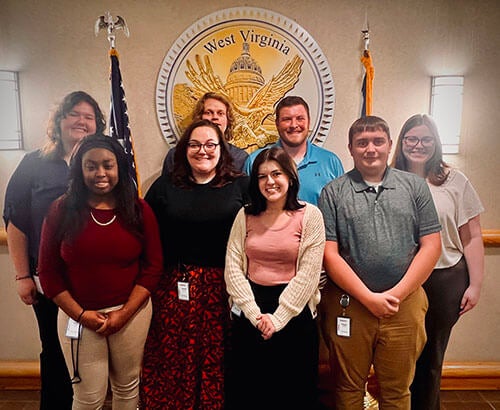“When I went to Marshall University, I had a wonderful experience working for the U.S. government in a similar program,” said Jeff Sandy, who recently retired as cabinet secretary for the West Virginia Department of Homeland Security. “The hands-on work experience gave me an opportunity to become a special agent, sheriff and cabinet secretary. This is a special program, and I know it will help these talented students achieve their goals after graduation.”
This first round of interns participating in the West Virginia Fusion Center’s Marshall Cyber Forensics and Security Internship Program include Abrianna Angus, Alisha Joseph, Emma Meadows, George Urling, Hannah Carroll, Kaylin Hayes, Reece Thomas and Robert Miller II. They were each recommended as candidates for the internship positions by the teaching staff at Marshall before going through an interview process with the West Virginia Fusion Center.
The program started last month and will continue through May 2024.
“This is such a great opportunity for our students,” said John Sammons, associate director of Marshall’s Institute for Cyber Security. “It gives them significant real-world experience ahead of graduation and pays them while they do it. The program pays the students enough that they can make a major dent in their tuition if they choose to do so. We’d like to also note that students from multiple programs are participating.
“On behalf of the university and all the students, we’d like to thank Secretary Sandy, Director Jack Luikart, Deputy Director Steven Patterson and the members of the West Virginia Legislature for their support of this highly innovative program,” Sammons said.
Recruitment and selection of the next cohort of interns will begin in the middle of the Spring 2024 semester. Successful students will have knowledge and experience in open-source intelligence collection and analysis as well as cyber forensics, Sammons said. An announcement will be made when the application process opens.
Participants will graduate with an advantage in the job market, as they have obtained real-world experience that they can apply with a future employer.
“The program benefits the state in that it provides additional resources to agencies across West Virginia,” Sammons said. “It also builds a stronger relationship between our state agencies and our universities.”
Students said they’re grateful for the chance to tackle real-world digital challenges.
“The chance to review digital evidence and dig into actual cases as an intern gives me a sense of success,” Thomas said. “So far, each case I have looked at takes the form of an intriguing puzzle that makes me critically think, and problem solve. Finding hidden details and reconstructing events from digital artifacts is incredibly exciting. The professionals at the Fusion Center have already taught me so much in the few weeks I have been there and have been so welcoming to all of us interns. I am super excited to keep learning from the professionals at the Fusion Center and be able to take this knowledge back to Marshall University.”
Joseph said her favorite aspect of the internship has been “the hands-on experience with creating portable cases, examining evidence, assisting in intelligence gathering and observing evidence collection.
“This experience has made me more confident in my career journey and ready for the job market,” Joseph said.
Not only will the internship help them find employment after graduation, but it’s helpful now, Miller said.
“I am especially grateful for the pay aspect of this internship,” he said. “These opportunities that give you experience and pay are hard to come by, but are necessary for students like me who don’t get to stay at home while attending school.”
For more information about Marshall’s cyber-related academic, research and community outreach programs, visit www.marshall.edu/cyber.
———–
Photo: Eight Marshall University cyber students kicked off an internship this summer with the West Virginia Department of Homeland Security’s Fusion Center. Back Row, from left to right: Abrianna Angus, Reece Thomas, Robert Miller II, Emma Meadows. Front row, from left to right: Alisha Joseph, Hannah Carroll, Kaylyn Hayes, George Urling.

